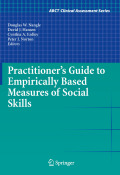
Practitioner's guide to empirically based measures of social skills
Nangle, Douglas W.
Hansen, David J.
Erdley, Cynthia A.
Norton, Peter J.
Social skills are at the core of mental health, so much so that deficits in this area are a criterion of clinical disorders, across both the developmental spectrum and the DSM. The Practitioner’s Guide to Empirically-Based Measures of Social Skills gives clinicians and researchers an authoritative resource reflecting the ever growing interest in social skills assessment and its clinicalapplications. This one-of-a-kind reference approaches social skills from a social learning perspective, combining conceptual background with practical considerations, and organized for easy access to material relevant to assessment of children, adolescents, and adults. The contributors’ expert guidance covers developmental and diversity issues, and includes suggestions for the full range of assessment methods, so readers can be confident of reliable, valid testing leading to appropriate interventions. Key features of the Guide: An officialpublication of the Association for Behavioral and Cognitive Therapies Describes empirically-based assessment across the lifespan. Provides in-depth reviewsof nearly 100 measures, their administration and scoring, psychometric properties, and references. Highlights specific clinical problems, including substance abuse, aggression, schizophrenia, intellectual disabilities, autism spectrum disorders, and social anxiety. Includes at-a-glance summaries of all reviewed measures. Offers full reproduction of more than a dozen measures for children, adolescents, and adults, e.g. the Interpersonal Competence Questionnaire and the Teenage Inventory of Social Skills. As social skills assessment and training becomes more crucial to current practice and research, the Practitioner’sGuide to Empirically-Based Measures of Social Skills is a steady resource that clinicians, researchers, and graduate students will want close at hand. INDICE: I. Conceptual Foundations.- Defining Competence and Identifying Target Skills.- Social Cognitive Models and Skills.- A Conceptual Basis in Social Learning Theory.- II. Social Skills and Psychological Adjustment.- AssessingChildren and Adolescents.- Assessing Adults.- Social Skills Interventions.- III. Developmental Factors Related to the Assessment of Social Skills.- Diversity Considerations in the Assessing Social Skills.- Anger and Aggression.- Social Anxiety and Withdrawal.- Assessment of Social Skills and Intellectual Disability.- Assessment of Social Skills and Social Competence in Learners with Autism Spectrum Disorders.- Schizophrenia.- Assessment of Social Skills in Substance Abuse Disorders.- IV. Measure Reviews.- Child Measures.- Adolescent Measures.- Adult Measures.- Appendix A. Quickview Guides.- Appendix B. Reprinted Measures.- Appendix C. Glossary.
- ISBN: 978-1-4419-0608-3
- Editorial: Springer
- Encuadernacion: Rústica
- Páginas: 610
- Fecha Publicación: 01/12/2009
- Nº Volúmenes: 1
- Idioma: Inglés
